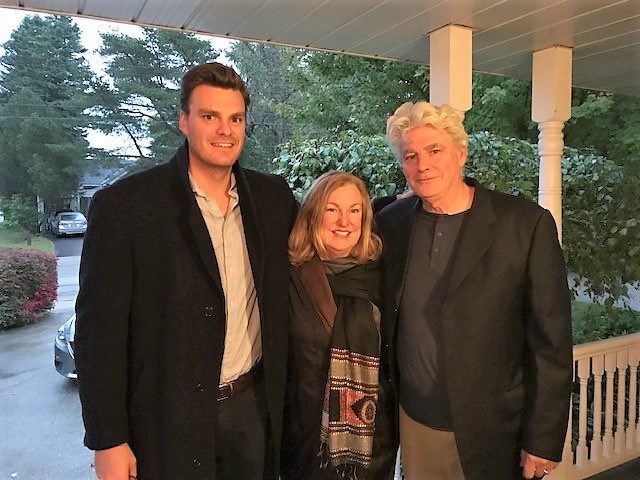While her career has taken her all over the world over the past 40 years, Collingwood resident Elizabeth Klinck says there’s nothing like the allure of southern Georgian Bay.
Klinck’s career as a film researcher was recently highlighted at Hot Docs as part of its 2023 Focus On spotlight series. Called an “icon of Canadian documentary cinema” by the association, Klinck is currently in Europe working on her latest project, but took time out of her schedule for an interview about her 40-year film career, her love of movies and her future plans.
In Hot Docs’ 30-year history, the association has honoured documentary directors through its Focus On series. This year marks the first time a non-director has been featured.
“They decided they wanted to honour someone who worked in the craft. I was the first person they offered it to,” Klinck said. “It was a lovely tribute, on their 30th anniversary, because I was there from the very beginning. I felt it was a nice trajectory.”
Klinck and her husband, John Martin, who also works in the industry as a location sound recordist, moved to Collingwood about 15 years ago.
“My husband is from Prince Edward Island, and he always thought Georgian Bay was the closest you can come to an ocean within the continent,” Klinck said with a laugh. “We also had friends who lived there and we’ve always been drawn to Georgian Bay and its natural beauty.”
With a degree in English and history from Queen’s University, Klinck said she remembers first being drawn to international films during her post-secondary days.
“(Films) were always something that I loved. My father was an amateur photographer and we would go see a lot of films as a family,” she said.
Upon graduation, she moved to Winnipeg and worked for the Winnipeg Film Group. Shortly after, she moved into a role at the National Film Board of Canada in Montreal.
“I had some wonderful mentors there, and I really learned the craft. I was very lucky,” she said.
As a film researcher, Klinck works with documentary directors to help bring their visions for the presentation of a story to life.
“They’ll explain to me what their idea is and whether there’s a need for any archive research, and if there’s footage that needs to be researched, found and negotiated in terms of licensing. I also work in music licensing, so (I can help) if there are certain songs they want to include,” she said.
“In the early days, I would find protagonists for films, or experts, or sometimes locations.”
While Klinck boasts a resumé of more than 300 films over the course of her career, a standout experience for her was recently working on Werner Herzog: Radical Dreamer.
“It was in honour of his 80th birthday. I was able to work with a few German researchers and also see his entire collection of films, starting from when he was a young student. He’s one of the greats. It was a real privilege,” she said.
She also worked on Gordon Lightfoot: If You Could Read My Mind, the 2019 documentary about the Orillia-born musician.
“It was one of my favourite films that I worked on. It had that local (connection) in researching his early days singing in Orillia,” she said.
When Klinck speaks about her work, her passion for the craft comes across.
“At the end of the day, or in the middle of the night (when I’m working), I’ll look at the clock and wonder where the time has gone,” she said with a laugh. “It’s always been something I’ve had a great love for.
“I also have a great love for sharing information. It’s not something that’s really taught in film or journalism schools. I do a lot of workshops and teaching at universities around the world. It’s been very satisfying.”
When asked what advice she would give to up-and-coming filmmakers who have an interest in film researching, Klinck said a healthy curiosity will get them far.
“You have to be quite diligent and detail oriented because there’s an awful lot of things to keep in mind when you’re clearing. You need to have a good background in research, but also a good idea of what happens in the post-production part. You also need to know how to negotiate well,” she said.
“If I were to talk to a young person who was interested, I would tell them to try to find someone to mentor with.”
Klinck is currently working on some passion projects with filmmakers and is teaching at workshops around the world.
“I have no plans to slow down,” she said. “I’m delighted I’m able to share information I’ve had the privilege of acquiring over 40 years.”
She also speaks fondly of the effect of the work she does on a global scale.
“One of the things that’s very satisfying for me is, whenever I work on a film — by the very nature of my work — I’m working to preserve material that might otherwise get lost,” she said.
“By working in this area ... I think we’re able to preserve our history in Canada and around the world for generations to come.”

.png;w=120;h=80;mode=crop)

